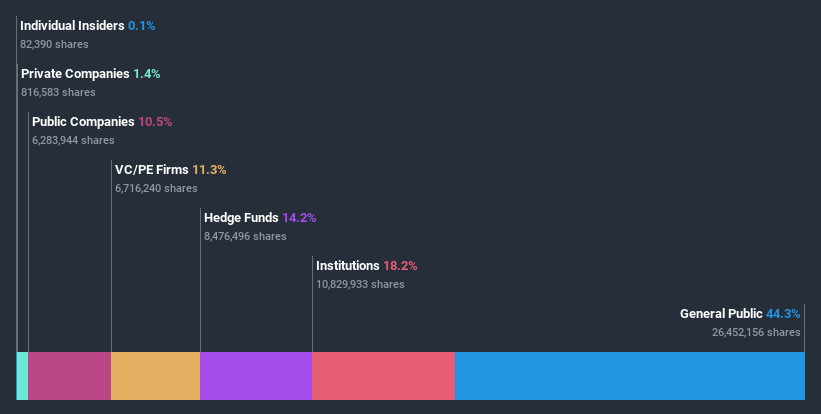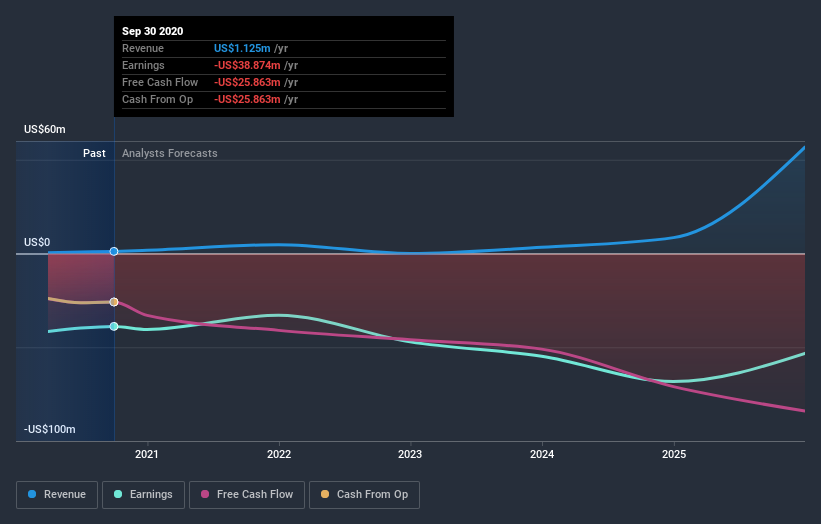- United States
- /
- Biotech
- /
- NasdaqCM:CYPH
Could The Leap Therapeutics, Inc. (NASDAQ:LPTX) Ownership Structure Tell Us Something Useful?
A look at the shareholders of Leap Therapeutics, Inc. (NASDAQ:LPTX) can tell us which group is most powerful. Generally speaking, as a company grows, institutions will increase their ownership. Conversely, insiders often decrease their ownership over time. Companies that have been privatized tend to have low insider ownership.
With a market capitalization of US$153m, Leap Therapeutics is a small cap stock, so it might not be well known by many institutional investors. Taking a look at our data on the ownership groups (below), it seems that institutions own shares in the company. We can zoom in on the different ownership groups, to learn more about Leap Therapeutics.
Check out our latest analysis for Leap Therapeutics

What Does The Institutional Ownership Tell Us About Leap Therapeutics?
Institutional investors commonly compare their own returns to the returns of a commonly followed index. So they generally do consider buying larger companies that are included in the relevant benchmark index.
We can see that Leap Therapeutics does have institutional investors; and they hold a good portion of the company's stock. This can indicate that the company has a certain degree of credibility in the investment community. However, it is best to be wary of relying on the supposed validation that comes with institutional investors. They too, get it wrong sometimes. It is not uncommon to see a big share price drop if two large institutional investors try to sell out of a stock at the same time. So it is worth checking the past earnings trajectory of Leap Therapeutics, (below). Of course, keep in mind that there are other factors to consider, too.

Our data indicates that hedge funds own 14% of Leap Therapeutics. That catches my attention because hedge funds sometimes try to influence management, or bring about changes that will create near term value for shareholders. The company's largest shareholder is Perceptive Advisors LLC, with ownership of 14%. With 8.1% and 6.2% of the shares outstanding respectively, BeiGene, Ltd. and Hillhouse Capital Management, Ltd. are the second and third largest shareholders.
After doing some more digging, we found that the top 15 have the combined ownership of 50% in the company, suggesting that no single shareholder has significant control over the company.
While it makes sense to study institutional ownership data for a company, it also makes sense to study analyst sentiments to know which way the wind is blowing. Quite a few analysts cover the stock, so you could look into forecast growth quite easily.
Insider Ownership Of Leap Therapeutics
While the precise definition of an insider can be subjective, almost everyone considers board members to be insiders. Management ultimately answers to the board. However, it is not uncommon for managers to be executive board members, especially if they are a founder or the CEO.
I generally consider insider ownership to be a good thing. However, on some occasions it makes it more difficult for other shareholders to hold the board accountable for decisions.
Our information suggests that Leap Therapeutics, Inc. insiders own under 1% of the company. We do note, however, it is possible insiders have an indirect interest through a private company or other corporate structure. It has a market capitalization of just US$153m, and the board has only US$212k worth of shares in their own names. I generally like to see a board more invested. However it might be worth checking if those insiders have been buying.
General Public Ownership
With a 44% ownership, the general public have some degree of sway over Leap Therapeutics. While this group can't necessarily call the shots, it can certainly have a real influence on how the company is run.
Private Equity Ownership
With an ownership of 11%, private equity firms are in a position to play a role in shaping corporate strategy with a focus on value creation. Some investors might be encouraged by this, since private equity are sometimes able to encourage strategies that help the market see the value in the company. Alternatively, those holders might be exiting the investment after taking it public.
Public Company Ownership
Public companies currently own 11% of Leap Therapeutics stock. It's hard to say for sure but this suggests they have entwined business interests. This might be a strategic stake, so it's worth watching this space for changes in ownership.
Next Steps:
It's always worth thinking about the different groups who own shares in a company. But to understand Leap Therapeutics better, we need to consider many other factors. Like risks, for instance. Every company has them, and we've spotted 5 warning signs for Leap Therapeutics (of which 2 can't be ignored!) you should know about.
If you would prefer discover what analysts are predicting in terms of future growth, do not miss this free report on analyst forecasts.
NB: Figures in this article are calculated using data from the last twelve months, which refer to the 12-month period ending on the last date of the month the financial statement is dated. This may not be consistent with full year annual report figures.
If you decide to trade Leap Therapeutics, use the lowest-cost* platform that is rated #1 Overall by Barron’s, Interactive Brokers. Trade stocks, options, futures, forex, bonds and funds on 135 markets, all from a single integrated account. Promoted
New: AI Stock Screener & Alerts
Our new AI Stock Screener scans the market every day to uncover opportunities.
• Dividend Powerhouses (3%+ Yield)
• Undervalued Small Caps with Insider Buying
• High growth Tech and AI Companies
Or build your own from over 50 metrics.
This article by Simply Wall St is general in nature. It does not constitute a recommendation to buy or sell any stock, and does not take account of your objectives, or your financial situation. We aim to bring you long-term focused analysis driven by fundamental data. Note that our analysis may not factor in the latest price-sensitive company announcements or qualitative material. Simply Wall St has no position in any stocks mentioned.
*Interactive Brokers Rated Lowest Cost Broker by StockBrokers.com Annual Online Review 2020
Have feedback on this article? Concerned about the content? Get in touch with us directly. Alternatively, email editorial-team (at) simplywallst.com.
About NasdaqCM:CYPH
Cypherpunk Technologies
A biopharmaceutical company, acquires and develops antibody therapies for the treatment of cancer.
Flawless balance sheet with slight risk.
Market Insights
Community Narratives




